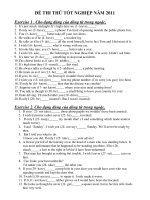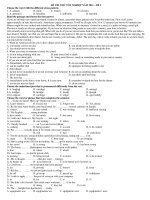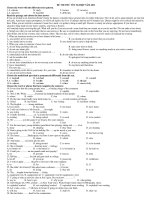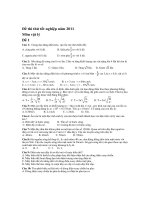ĐỀ THI THỬ TỐT NGHIỆP NĂM 2011 – ĐỀ 2 pps
Bạn đang xem bản rút gọn của tài liệu. Xem và tải ngay bản đầy đủ của tài liệu tại đây (101.98 KB, 2 trang )
ĐỀ THI THỬ TỐT NGHIỆP NĂM 2011 – ĐỀ 2
Choose the word with the different stress pattern.
1. A. educate B. study C. learner D. inventor
2. A. attractive B. beautiful C. difficulty D. harmful
Read the passage and choose the best answer
If you are invited to an American friend’s home for dinner, remember these general rules for polite behaviour. First of all, arrive
approximately on time but not early. Americans expect promptness. It will be all right to be 10 or 15 minutes late but not 45 minutes late.
Dinner might be over-cooked and ruined by then. When you are invited to someone’s home for a meal, it is polite to bring a small gift.
Flowers or candy are always appropriate. If you have an attractive thing made in your native country, your host or hostess
will certainly enjoy receiving that gift. What will you do if you are served some food that you cannot eat or you do not like? Do not make a
fuss about it. Simply eat what you can and hope that no one notices it. Be sure to compliment the cook on the food that you are enjoying. Do
not leave immediately after dinner, but do not overstay your welcome, either. The next day, call or write a thank-you note to say how much
you enjoyed the evening.
3. When an American invites you to have dinner at his home ……………
A. you needn’t arrive on time B. you should arrive late to show that you are polite
C. you should arrive on time D. you should arrive early to help the host.
4. When you come to someone’s house for a meal
A. do not bring anything with you . B. take some food or drink
C. do not care about gifts D. bring some flowers, candy or something made in your native country
5. If you are served some food that you cannot eat …
A. immediately tell the host about this B. do not make fuss about it
C. ask for another dish D. apologize for being unable to eat
6. After dinner, …………
A. do not leave immediately or do not overstay your welcome B. do not say anything about the cook .
C. leave immediately D. stay there until bed-time.
7. The next day……………
A. immediately invite him to your home. It is your turn. B. remember to thank the host for the dinner
C. you do not need to thank D. all are correct
Choose the underlined part that is pronounced differently from the rest.
8. A. laughed B. watched C. missed D. wanted
9.A. weather B. breathe C. breath D. though
10.A. educate B. continue C. refuse D. successfully
Choose the word or phrase that best completes the sentence:
11. _“Come on Susan! Hurry up! Drink your milk.”-“ ………“
A. I can’t finish it B. Excuse me C. Forgive me D. Yes, please
12. By the time Anna finally came back home, he …………….several countries in Europe.
A. visited B. had visited C. was visiting D. had been visiting
13. The English strong traditions.
A. have much B. has much C. has many D. have many
14. I still can’t believe it. My bicycle last night.
A. was stolen B. was stealing C. stolen D. stole
15. I finally finished at 7 p.m and served dinner.
A. cooking B. being cooked C. to cook D. to be cooked
16. We won the game if we’d had a few more minutes.
A. ˇ B. will C. had D. could have
17. For the most part, young children spend their time playing, eating and a lot.
A. sleep B. sleeping C. they sleep D. are sleeping
18. Han is going to the USA for his holiday. He up for nearly a year now.
A. has saved B. is saving C. saves D. has been saving
19. The house Shakespeare was born is now open to the public.
A. that B. where C. which D. who
20. Ann hopes …….to join ht private club.
A. inviting B. being invited C. to invite D. to be invited
21. She is thought …………….than her sister ….biology.
A. be better/ on B. to be better/ in C. to be better/ at D. be best/ on
22. Could you me ten pounds until next payday?
A. let B. provide C. borrow D. lend
23. Bill has his job and gone back to college.
A. let off B. given up C. passed up D .withdrawn
24. I wish to apply the post of surveyor with your company.
A. in B. for C. to D.
25. She didn’t do it herself. She asked some workmen it for her.
A. do B. doing C. they did D. to do
26. The ….bought from that factory … faulty.
A. equipment/ was B. equipments/ are C. equipment/ were D. equipments / were
27. “I won’t go camping next year”-“.…………”
A. I won’t, too B. I won’t neither C. I won’t either D. So I won’t
28. “Would you like me to pick you up?” “………… ”
A. That would be great fun B. No, thank you C. Yes, thanks. That’s very kind of you D. Yes, I’d like
29. Let’s take a vote,… ? All those in favour of going on strike raise your hand.
A. will you B. won’t you C. shall we D. shan’t us
30. She had better …… hard for the examination.
A. working B. work C. to work D. is working
31. Can you find it without ……… check the files?
A. must B. have to C. to have to D. having to
32. “ With ……do you wish to speak? The receptionist asked me.
A. what B. who C. whom D. which
33. Mary will not do homework …… you tell her.
A. because B. unless C. since D. however
34. This is the most expensive car I have ……driven.
A. always B. often C. sometimes D. ever
35. Where is the book of ….for using this washing machine?
A. instructions B. directives C. regulations D. orders
Choose the correct sentence with the same meaning as the given one.
36. She said to us, “Don’t be late again.”
A. She said to us not to be late again. B. She told us to be not late again.
C. She told to us not to be late again. D. She told us not to be late again.
37. Juliet finds it strange to drive on the left.
A. Driving on the left is too strange for Juliet to find. B. Driving on the left is too strange to find.
C. Juliet is not used to drive on the left. D. Juliet is not used to driving on the left.
38. Six years ago we started writing to each other.
A. We’ve been writing to each other for six years. B. We’ve been writing to each other since six years.
C. We used to write to each other for six years. D. We’re used to write to each other for six years.
39. The rain began to fall during my walk in the country.
A. While I walked in the country, I had rained. B. While it was beginning to rain, I had walked in the country.
C. While I was walking in the country, it began to rain. D. While it began to rain in the country, I was walking.
40. The picnic was cancelled because it rained.
A. If it didn’t rain, the picnic wouldn’t be cancelled. B. If it hadn’t rained, the picnic wouldn’t have been cancelled.
C. If it didn’t rain, the picnic wouldn’t have been cancelled. D. If it hadn’t rain, the picnic wouldn’t be cancelled.
Choose the word or phrase in each sentence that needs correcting
41. Barbara sat (A) under a tree, (B) talking quietly while the others (C) played a game of tennis (D) near the river.
42. Do you (A) remember the guy (B) when we saw outside the (C) Petersons’ home (D) last week?
43. Ms Bettie Quinne (A) used be (B)thought to work (C) in some (D) international organizations
44. (A) According to a team (B) of biologists, (C) there are some further information about (D) coal bears.
45. (A) In spite of he tried a lot, (B) the result (C) was not very (D) satisfactory.
Choose the word or the phrase which best fits each gap :
Our programme tonight is about” The English language”.
First, let’s have a look 46… its history. Two thousand years ago the British Isles were 47…… by speakers of Celtic languages. Next to
Celtic languages was Latin which was the official language of government from 43 B.C to about A.D 410 in the areas which are now
England and Wales. 48……… the fourth and seventh centuries A.D., the Anglo-Saxons arrived. They spoke a Germanic language which
forms the basis of modern English…
English is much 49……… from the language which was once brought across the North Sea by the Anglo-Saxons.
Although the Anglo-Saxons would be able to recognize many individual words, it’s the way in which those words are put together to make
sentences that would be hardly recognizable to them.
Many people say it’s the flexibility of function of individual words, the assimilation of borrowings and the spontaneous creation of new
words that have made English an effective medium of 50……. communication.
46. A. on B. to C. from D. at
47. A . lived B. inhabited C. known D. inhabits
48. A. Both B. Between C. Without D. During
49. A. different B. fond C. difference D. fondly
50. A. international C. national C. nationally D. internationally
ANSWER KEYS:
1. D 2. A 3. C 4. D 5. B 6. A 7. B 8. D 9. C 10. D
11. A 12. B 13. D 14. A 15. A 16. D 17. B 18. D 19. B 20. D
21. C 22. D 23. B 24. B 25. D 26. A 27. C 28. C 29. C 30. B
31. D 32. C 33. B 34. D 35. A 36. D 37. D 38. A 39. C 40. B
41. C 42. B 43. A 44. C 45. A 46. D 47. B 48. B 49. A 50. A









